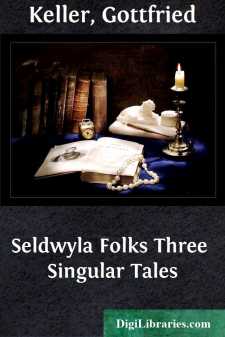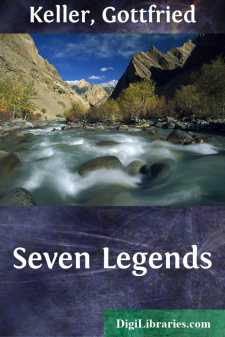Categories
- Antiques & Collectibles 13
- Architecture 36
- Art 48
- Bibles 22
- Biography & Autobiography 813
- Body, Mind & Spirit 142
- Business & Economics 28
- Children's Books 16
- Children's Fiction 13
- Computers 4
- Cooking 94
- Crafts & Hobbies 4
- Drama 346
- Education 46
- Family & Relationships 57
- Fiction 11829
- Games 19
- Gardening 17
- Health & Fitness 34
- History 1377
- House & Home 1
- Humor 147
- Juvenile Fiction 1873
- Juvenile Nonfiction 202
- Language Arts & Disciplines 88
- Law 16
- Literary Collections 686
- Literary Criticism 179
- Mathematics 13
- Medical 41
- Music 40
- Nature 179
- Non-Classifiable 1768
- Performing Arts 7
- Periodicals 1453
- Philosophy 64
- Photography 2
- Poetry 896
- Political Science 203
- Psychology 42
- Reference 154
- Religion 513
- Science 126
- Self-Help 84
- Social Science 81
- Sports & Recreation 34
- Study Aids 3
- Technology & Engineering 59
- Transportation 23
- Travel 463
- True Crime 29
Seldwyla Folks Three Singular Tales
by: Gottfried Keller
Description:
Excerpt
Gottfried Keller may fitly be called the greatest narrative writer that Switzerland has ever produced. Born July 19, 1819, near Zurich, he was reared in direst poverty. By dint of the hardest labor and by practicing the utmost frugality, his father was barely able to provide bread for wife and children. But in the midst of this penury the genius of his young son Gottfried expanded. As a mere child he gave already unmistakable evidence of being a dreamer, a thinker, a philosopher, a "fabulist," an artist. Just able to write, the little boy forever scribbled poems and fanciful tales, made rapid sketches with pencil and pen, portraits, caricatures, landscapes. At the village school he imbibed knowledge like a sponge. Soon the gnarled old schoolmaster, half peasant, half teacher, looked aghast at his little scholar: he had no more to teach him. Generous friends sent the youth to Munich, there to study art. For at that time his desire was to become a great painter. Desperately and with fiery energy the young fellow devoted himself to study, and his attainments were considerable. They would fully have sufficed for a career as a mediocre portrait painter. But his very excess of zeal led to surfeit, to exhaustion, to a period of lethargy. "All work and no play makes Jack a dull boy." This fit of listlessness lasted even for some time after Gottfried's return home. All effort with him slackened.
Patrons finally intervened. With their aid he went to Heidelberg, and for two full years, 1848-1850, he there pursued literary and historical research. The historian, Hettner, took great interest in the young Swiss. Next he went to Berlin, and during the ensuing five years he wrote and studied in a desultory manner there. Great attention was paid him by Goethe's intimate friend, Varnhagen von Ense, and the latter's wife, the "seeress," Rahel, who drew the shy young man into their wide literary circle, comprising for two decades the beaux esprits of the capital. But his bluntness of speech, his sturdy Swiss republicanism, often gave offense.
For that was one of the remarkable points about Gottfried Keller: despite his long residence on German soil and the flattering reception accorded him by the intellectual elite there, he remained a thorough democrat, an uncompromising friend of the plain people, a fearless champion of Swiss free government, a hater of tyranny in any form, a despiser of monarchs and their favors. Among his poems, later collected into a bulky tome, there are many that breathe defiance to royalty by "divine grace."
Much of this sentiment of anti-monarchism has crept into his first great work, the "Gruener Heinrich." This, a sort of autobiography in guise of a big novel, alive with adventure as well as thoughts on men and things, he first published from 1854 to 1855, but it was afterward recast in characteristic fashion, 1879-1881. In a manner of speaking, his "Gruener Heinrich" is also a confession of faith. There are many didactic passages in it; the whole book, in fact, breathes the convictions of its author. This is still more the case with the last great work from Keller's pen, "Martin Salander," where the frequent political and social precepts interwoven into the text of the story form, from the purely artistic viewpoint, a serious blemish.
It is generally conceded that Keller's masterpiece is "Seldwyla Folks" ("Die Leute von Seldwyla"), which appeared in two sections, the first of these in 1856, the second in 1874. From this group of weird, fantastic tales the three forming the contents of this book are taken. About the origin of the title Keller himself has written in his inimitably oracular and whimsical style. The name and the town itself are wholly fictitious. They represent a sort of collective traits of a number of ancient, unprogressive Swiss towns, left head over heels in medievalism, in outworn customs, with some peculiar features exclusively their own. Each tale is a jewel cut and polished, a distinctive literary entity, something that may not be duplicated elsewhere in the whole realm of letters, with a full flavor of its own. Where, for instance, in the literature of any tongue, is to be found a humorous-sarcastic story of the raciness of "The Three Decent Combmakers"?
From 1861 to 1878 Keller filled, to the eminent satisfaction of his countrymen, the important and remunerative office of "Staatsschreiber," one that combined the duties of secretary of state with those of custodian of documents and librarian for his native canton, which was offered him in direct recognition of his literary merits....



